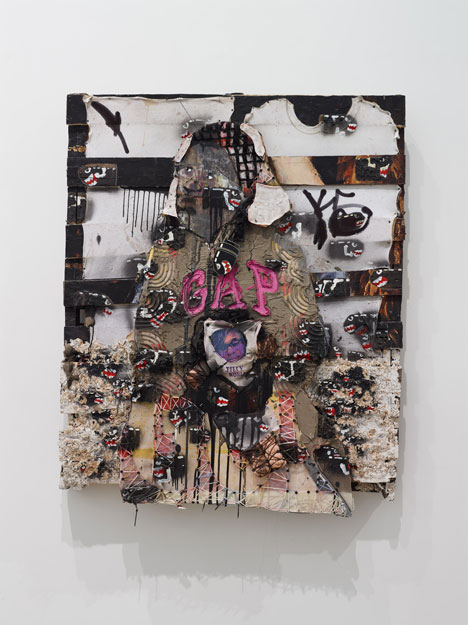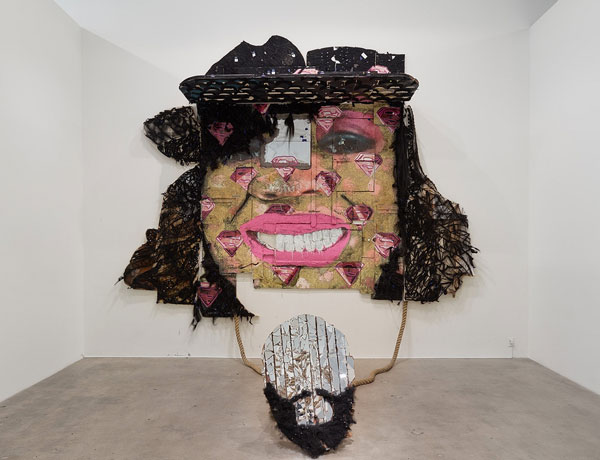Your cart is currently empty!
Aaron Fowler

Every surface, each object of Aaron Fowler’s thirteen assemblage paintings in “Blessings On Blessings,” has been contemplated, touched and worked to build layers of meaning and matter that cohere and disrupt. Dimensionality—of ideas, materials, possible readings—is the point of return for this visually engaging and powerful show.
Several of these mixed-media works are over 10×12 feet, roughly the scale of an academic history painting. As an artist who gets and critiques (art) history, Fowler’s first solo exhibition is a body of work that presents different decisions about who gets included in (American) history. He’s in many of the pieces as The Pilgrim—a “mirror character” constructed from fragmented CDs and mirror shards and so is the extended family of black America. At 12×14 feet, Black Flag (2015) speaks clearly of Fowler’s broad vision.
Conceptually and literally stating who gets a seat at the table, Fowler constructed Black Flag from 15 card tables whose unfolded legs move the entire work 30 inches out from the gallery wall. This work shows family and friends around a long table that could represent history in the making, as well as a history of what’s been. And at the head, sitting in a chair raised far above the floor on long poles, is a bearded black man, who presides and joins in. He’s always been there. Direct eye contact comes from a smiling woman who seems to recognize us; on her dress is a sugar packet-sized wrapper that states: “sit.” Nearby, words on the skirt of an outlined figure read: “Dance/Happy/Open Eyes.” In Black Flag, and throughout the show, Fowler makes community—art and lives brought together from what’s out there, now in the picture.

This art lets us move between and into dimensions. Stepping close, we see surfaces that are staggeringly beautiful both because they’re composed out of the universe of society’s familiar discards—broken furniture, water bottles, trash bags—and because of Fowler’s skill as a painter. He can compose with detritus as well as with oil and acrylic. Stepping back, distanced from the details, we take in the big themes: communal gatherings, as in Black Flag; epic arrivals, in Real N::::: (2015) and Landing (2015); and people Fowler holds dear, Jelly’s Little Girl (2015) and Mom Knows (2016). We move into the specificities of Fowler’s myriad references and back out to the key issues: who belongs, what’s real, who dies, who survives and thrives. Concept and material are joined to echo lived experience: we move between daily stuff and the long, hard process of transforming what is.
“Always down for the cause, never down for the count,” Big Sean’s line from his 2015 song, “Blessings,” (and reference for Fowler’s title) reverberates through this exhibit. The handmade caution tape in Win (2015) says it another way in bold black letters across the gallery wall, “play the game don’t let the game play you,” a continuous loop of caution and encouragement.